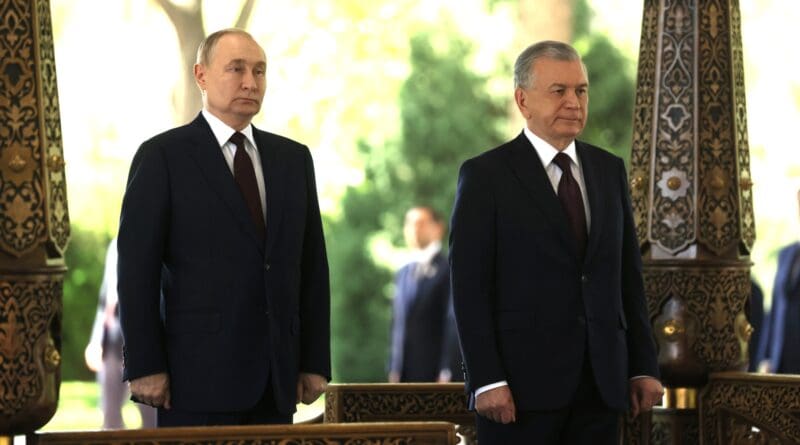Why Is Russia Promoting A Type Of Logistics That Could Be Seen As Reasonable Mostly In Case Of Conflict With Kazakhstan? – OpEd
Arriving in post-Soviet Uzbekistan on May 26, Russian President Vladimir Putin met with his counterpart Shavkat Mirziyoyev before the commencement of official negotiations. Russian news outlets said that they traveled in a single car together immediately after the friendly hugs at the ramp at the airport in Tashkent.
On this occasion, Vladimir Putin was accompanied by Russian government officials and heads of some 20 provinces of the Russian Federation. Among the latter was also Igor Babushkin, the Governor of the Astrakhan Province. According to mass media reports, he and Prime Minister of the Republic of Uzbekistan Abdulla Aripov discussed opportunities for delivering Uzbek cargo by water through the International Port of Turkmenbashy [in Turkmenistan] to the ports of the Astrakhan Province. The negotiations were held during the visit of the Russian delegation to Tashkent, reports the Virtual Customs edition with reference to the press service of the government of the Astrakhan Province. The parties viewed options to deliver goods from Uzbekistan to Russia by sea route. Currently, they are delivered to Astrakhan by road and rail via Kazakhstan. Igor Babushkin suggested that Uzbek companies and entrepreneurs could use the transit opportunities of Astrakhan to supply goods from Uzbekistan to Russia.
In particular, he and Abdulla Aripov discussed the prospects of delivering goods from Uzbekistan to Russia through the maritime component of the ‘North-South’ corridor in the direction of ‘Port of Turkmenbashy – ports of the Astrakhan Province’. If you call things by their names, it only means one thing: efforts to lay the way from Uzbekistan to Russia through Turkmenistan instead of Kazakhstan. There seems to be only one idea: to create that kind of transport connection between Russia and Uzbekistan, as well as Kyrgyzstan, Tajikistan, and Turkmenistan that would allow them all to bypass Kazakhstan. It has been in the air for quite a long time. Anyway, it now is no longer mere words. Measures have been and are being taken to apply it in practice.
Early last year, negotiations between representatives of four countries – Russia, Turkmenistan, Kyrgyzstan and Uzbekistan – were held in Astrakhan on the organization of regular maritime transport lines between the port of Turkmenbashy [in Turkmenistan] and Russian ports in the Caspian Sea. In November 2023, Kyrgyzstan, Uzbekistan and Russia agreed to create and develop a transport corridor bypassing the territory of Kazakhstan. The corresponding memorandum was signed in Tashkent by the heads of the relevant ministries of the three countries following the results of the transport forum of the SCO (Shanghai Cooperation Organization) countries.
Under the new conditions, the choice should be made in favor of Turkmenistan as a transit country instead of Kazakhstan. Never mind that Turkmenistan, unlike Kazakhstan, is not a member of the Russia-led Eurasian Economic Union, and a Russian, Uzbek, and Kyrgyz are required to obtain a visa for transiting goods through that country.
But here’s the amazing part. A hundred and fifty years ago, after the Russian Empire had conquered the Central Asian feudal states, the Khanate of Kokand, the Emirate of Bukhara, and the Khanate of Khiva, Krasnovodsk (renamed in 1993 by President for Life Saparmurat Niyazov, after his self-proclaimed title Turkmenbashy – “Leader of all Turkmen”) became the tsarist Russia’s springboard for the exploitation and development of the Turkestan Gubernia (which back then covered the present-day territories of Uzbekistan, Turkmenistan, Tajikistan, Kyrgyzstan and Southern Kazakhstan). Construction of the Trans-Caspian Railway began back in 1879. Originally the line started from Uzun-Ada on the Caspian Sea, but the terminus was later shifted north to the harbor at Krasnovodsk (now Turkmenbashy). The Railway reached Samarkand via Bukhara in 1888, where it halted for ten years until extended to Tashkent and Andijan in 1898. In 1905, a ferry service connected Krasnovodsk (now Turkmenbashy) to the European part of the then-Russia, Baku.
The Trans-Caspian Railway and ferry service between Krasnovodsk (Turkmenbashy) and Baku then were the main transport artery connecting Central Asia with the rest of Russia. The railway network in Kazakhstan and other Central Asian republics had been significantly expanded during the Soviet years and the trans-Caspian transport routes from Central Asia as a whole to Russia lost their former importance because of the new economic realities. Russia now seems to be attempting – based on political motivations and with support from Kazakhstan’s Central Asian neighbors – to revitalize the logistic system that existed over a hundred years ago and adapt it to the new reality.
The reasons are called different. However, the key reason seems to be the tightened cargo transit rules introduced by Astana by the end of 2022, agreed upon with Washington and Brussels.
Anyway, it looks like Russia is promoting a type of logistics that could be seen as reasonable mostly in case of real conflict with Kazakhstan.

